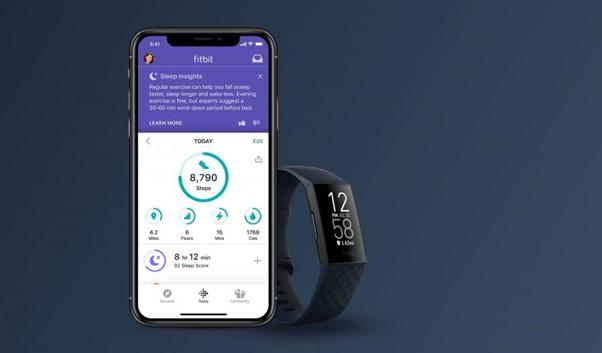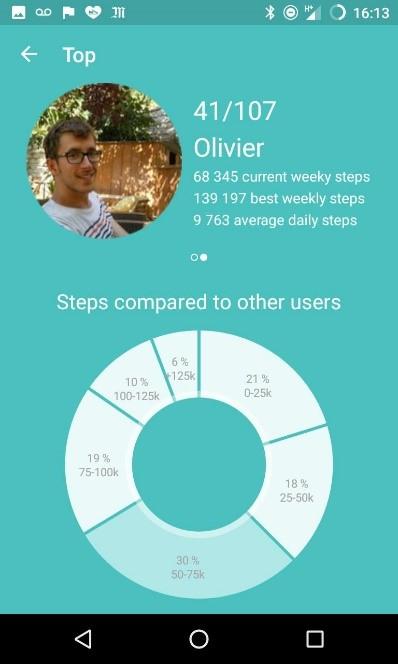
Fitbit and participatory surveillance of the modern individual
We live in a dynamic world that is continuously changing. Digital technologies have advanced more rapidly than any innovation in history, and the naturalization of digitality has become a social reality: smart devices have become a constant companion in all segments of our daily life. From tracking personal fitness developments to measuring vital functions such as blood pressure. It has become impossible to imagine life without the smart little helpers.
The aim of the article is to test the applicability of Foucault's 20th-century social theory to the contemporary phenomena shaped by digitalization and technology. Its focus will be on Foucault's concept of panopticon, exploring how profoundly digitalization has influenced his theory of power and knowledge. The effect of the internet on Foucault's social theory will be examined by zooming in on the example of the Fitbit app, which is in essence a digital panopticon.
The Fitbit app
Numerous smart devices have become part of various segments in our lives, their role is becoming increasingly important, and life without them has become unimaginable. They are designed to make our life easier and to facilitate countless daily activities one of which is sports.
Many people who go for a run, swim, cycle, or even just for a walk have a smartwatch on their wrist to track the time spent on the exercise or calories burnt during a workout. Fitbit is one of the biggest companies that offer many options for people who want to buy these smart devices.
Fitbit enables us to understand how participatory surveillance is a phenomenon that continues to develop according to social behaviors, norms, and gamification.
Fitbit is an American, California-based electronics and fitness company founded in 2007 by James Park and Eric Friedmann. Based on a 2020 report, Fitbit is considered to be the fifth-largest wearable business in the world. The company has around 28 million active users and has sold more than 100 million products (IDC,2020).
Moreover, Fitbit offers a wide variety of different products, such as smartwatches, wristbands, and scales that encourage users to get more active. These devices are equipped with various data tracking functions, such as step count, a sleep quality monitor, both a calories burned and consumed function, menstrual health tracking, and more. Users can set up their own daily or weekly goals, add their personal details like weight and height, and get precise overall activity planning after creating an account for free.

Figure 1: Fitbit watch and App
Because these devices cannot function properly without collecting the private data of users, several concerns are being raised about which data is stored where. Fitbit devices use statistics to offer a more complete view for users. These data are, among others, location tracking (for step count), heart rate, skin temperature measurement (for sleep quality monitoring), electrodermal activity detection (for blood oxygen level and stress management).
In the 21st century, the privacy policy is becoming increasingly important. Companies are required to specify how and what data they are collecting, and get the consent of users to collect their data. On the Fitbit website, under secrecy policy, they inform people about what data is being collected and for what purpose it is being used. As they say, Fitbit believes that "transparency is the key to any healthy relationship."
However, that hasn't always been the case. Fitbit was strongly criticized in 2011 due to its default activity-sharing settings which made users manually enter their physical activities. Many users included details about their sexual activities in their daily exercise logs. They could choose to keep their physical activity private, but some were unaware that the information was made public by default, and such highly private information became publicly available to anyone.
Foucault's Panopticon

Figure 2: Visualisation of Foucault's power-knowledge relationship based on observaction
Voluntarily sharing personal health information with fitness apps like Fitbit may seem harmless, but what users do not know is who can access and use their data. This concept of being watched anonymously through individual digital data at all times is very much in line with Foucault's (2003) idea of the panopticon as a mechanism of a detailed examination of the body to produce knowledge for social control.
Social control and citizen surveillance have made some appearances in society throughout the years in many different forms. It is therefore essential to look at the Panopticon metaphor used by Foucault (2003) in order to understand the power-knowledge relationship – the formation of knowledge through observing the population closely and the resulting knowledge as the basis for the exercise of power.
Foucault (2003) derived the concept of the power-knowledge relationship from the Panopticon, an architectural design by Jeremy Bentham. The design, which consisted of a rotunda with a watchtower or inspection house in the center, was used mainly for prisons, as well as asylums, hospitals, schools, and factories. This specific design made it possible for guards or other authority figures to surveil the inmates nonstop, without them knowing when they are being watched. The constant surveillance created by the observational system led inmates to adjust and control their behavior, as they did not know if they were being watched.
The philosopher Foucault took this concept of surveillance and used it to examine the power-knowledge dynamic. Foucault was convinced that knowledge is the greatest source of power. Foucault explained the dynamic between knowledge and power as follows, ‘by being combined and generalized, they attained a level at which the formation of knowledge and the increase in power regularly reinforce one another in a circular process’ (Foucault, 1977). Foucault believed that power occurs everywhere and comes from everywhere as it is a crucial ingredient in human interaction. For Foucault, power was also a main factor that created and shaped individuals in society.
Foucault and the Internet
It is important to note that Foucault’s work was composed in the 1960s and early 1970s, before the era of the Internet. According to Blommaert (2018), Foucault would consider the Internet to be an “absolute marvel” because his work considered a form of surveillance that can be applied to contemporary society. The modern Panopticon is noticeably more effective and influential than examples from before the digital era. As a result of digitalization, we live in a society where knowledge about individuals is aggregated nonstop – people share information about themselves on various online platforms, e.g. the gamified app of Fitbit. Internet is indeed a marvel – it demonstrates that the panopticon metaphor of Foucault is all the more relevant in the era of digitalization.
A panopticon on your wrist

Figure 3: Fitbit smartwatch
Fitbit is a case in point of the Foucauldian Panopticon in the era of digitalization. As Zuboff, an American author and social psychologist, accurately describes, "[t]he counterpart of the observation tower has become a screen" (Zuboff, 2019,p. 3). This is exactly what can be observed in the case of Fitbit: users' exercise information is constantly tracked and recorded, and converted to data, i.e. the basis for producing knowledge.
Firstly, let us look at the acceptability – or legitimacy – of the 'surveillance' practices of Fitbit. By using Fitbit apps, people (by default) agree to its privacy policies and grant consent for Fitbit to use their data as specified in the privacy agreement. Otherwise, users would be denied the service of Fitbit. The practice of getting people to agree to privacy policies and thereby make it legitimate for service providers to collect and use the data of their users has become so common that it has evolved into a norm. This norm, to a great degree, normalizes or even naturalizes the fact that users allow their behaviors to be surveilled in order to use the service of various online forms.
Secondly, the target consumers of Fitbit encompass people of all levels of fitness. However, the knowledge about the exercising body, which is generated from user data collected and processed by Fitbit apps and algorithms, would in one way or another become general norms concerning exercise, such as parameters of heart rate, respiration, etc. In this sense, Fitbit constitutes a segment of the digital panopticon that covers all aspects of human life and society. The Foucauldian panopticon represents a mechanism of social control on the basis of the production of knowledge through examination which in turn becomes a form of exercise of power.
Lastly, Fitbit makes use of gamified self-tracking which is a form of participatory surveillance. Fitbit, simply as a gamification app explicitly designed for entertainment, invites users to remain engaged in an activity by providing audiences with proactive directives and feedback through game mechanics and game dynamics added to online platforms that lead to the accomplishments of not only business goals and objectives. As Whitson mentions "successful gamification practices are reliant on encouraging playful subjectivities so that users voluntarily expose their personal information, which is then used to drive behavioral change (e.g. weight loss, workplace productivity, educational advancement, consumer loyalty, etc.)”, the goal of such an enterprise is to involve consumers, employees, and partners to inspire collaboration, share, and interaction. (Whitson,2013)
By gamifying everyday tasks such as exercise and healthy living, users can make solitary and tedious activities more enjoyable. At the very least with Fitbit's concept, users may feel they are making progress. This business strategy results in voluntary self-surveillance. Customers freely expose their personal information on a daily basis, giving often very detailed information that is collected and analyzed.
What is more, regardless of people’s knowledge and acceptance about the Fitbit observation, they not only participate but also find it enjoyable. Propelled by Fitbit’s elements of game and design, surveillance is depicted as something social and fun. Consequently, in the bigger picture, there exists public acceptance of surveillance.
Furthermore, personal information of users transformed into visualizations like graphs and statistics, reflecting on physical achievements are publicly visible on the profile. Hence, Fitbit user actions are observed by other users. This surveillance design function intends that users compare themselves to friends and compete with each other. This mirrors the panoptic nature of Fitbit; users' data can be observed at all times, which results in behavioral chance and increasing engagement at the platform.

Figure 4: Fitbit's compare function
The Fitbit app is a modern panopticon
It is clear that aspects of the 20th century offline social theory can be compared to that of the 21st online century. Thus, the theories of Foucault are important to understand as they have become increasingly relevant in how we understand the digital world. Through this analysis, it has become clear that we can indeed apply the social theory of Foucault's to our present digital world. Fitbit enables us to understand how participatory surveillance is a phenomenon that continues to develop according to social behaviors, norms, and gamification.
Therefore, the general notion of being watched and observed by the public still exists within modern technological surveillance capabilities. This affects us individuals in a similar manner. With the example of Fitbit, we as 21st-century individuals understand Foucault's interpretation of social behaviors and how they apply to our daily activities such as exercising. This is significant as it reminds us of how the modern individual is perceived. The most important dimension of identity is collective. We as modern individuals like to be a part of a particular group or community. Thus, most of us do not have an issue with being surveilled through domains like Fitbit. Consequently, we voluntarily live in a panoptic society due to the internet.
References
Foucault, M. (1977). Discipline and punish : the birth of the prison. New York : Pantheon Books
Foucault, M. (2003). Abnormal Lectures at the College de France 1974-1975. Verso Books
IDC. (2020) Shipments of Wearable Devices Reach 118.9 Million Units in the Fourth Quarter and 336.5 Million for 2019, According to IDC
Professor Jan Blommaert on Foucault and the internet
Whitson, J. R. (2013b, May 27). Gaming the Quantified Self | Surveillance & Society
Zuboff, S. (2019). The Age of Surveillance Capitalism . New York : Hachette Book Group